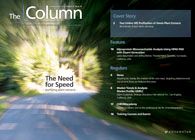Targeting phytochemicals
The North Carolina State University Plants for Human Health Institute (PHHI) and the Dole Nutrition Research Laboratory (Kannapolis, North Carolina, USA) have collaborated to form a joint industry-academic postdoctoral fellowship, the first of its kind at the North Carolina Research Campus (NCRC).
The North Carolina State University Plants for Human Health Institute (PHHI) and the Dole Nutrition Research Laboratory (Kannapolis, North Carolina, USA) have collaborated to form a joint industry-academic postdoctoral fellowship, the first of its kind at the North Carolina Research Campus (NCRC).
The jointly-funded postdoctoral position features dual expertise in nuclear magnetic resonance (NMR) and liquid chromatography–mass spectrometry(LC–MS). The position was a natural progression for PHHI and Dole as the identification and characterization of phytochemicals is at the core of each of their research programmes.
Nicholas D. Gillitt, PhD, director of nutrition research for Dole, commented: “Although we work in separate areas, our overall alignment is the same. We want to show the benefits of bioactives in fruits and vegetables.”
Mary Ann Lila, PhD, director of PHHI, added, “We’re on very parallel paths. We’re looking at different crops, but we have very similar interests that make us a natural fit for partnerships and collaborative research. We both work to get products that are efficacious for human health out to the marketplace, and we want to work together toward that common goal.”
Scott Neff, PhD, from the University of Iowa, Iowa, USA, is the first postdoc to take up the position and is currently profiling bananas using NMR and high performance liquid chromatography (HPLC) to identify new compounds. He commented: “This is a unique postdoc that is right up my alley and it also gives me the flavour of both industry and academia. Currently, we are continuing to work out the fine details of getting various samples and performing different types of extractions.”
For more information please visit ref="http://www.ncresearchcampus.net">www.ncresearchcampus.net
Regulatory Deadlines and Supply Chain Challenges Take Center Stage in Nitrosamine Discussion
April 10th 2025During an LCGC International peer exchange, Aloka Srinivasan, Mayank Bhanti, and Amber Burch discussed the regulatory deadlines and supply chain challenges that come with nitrosamine analysis.











